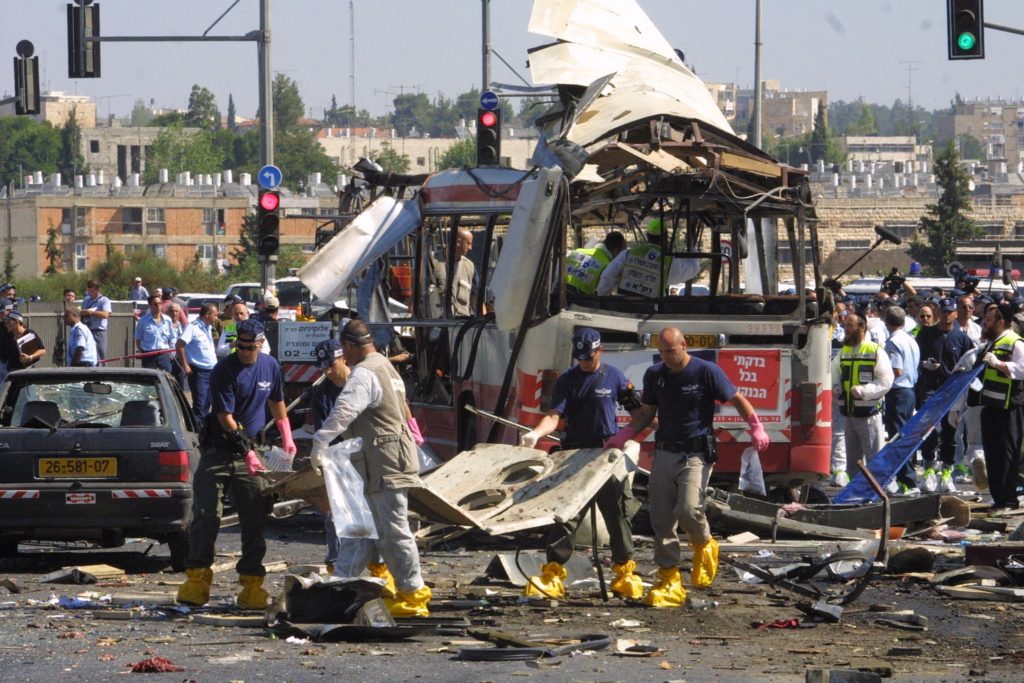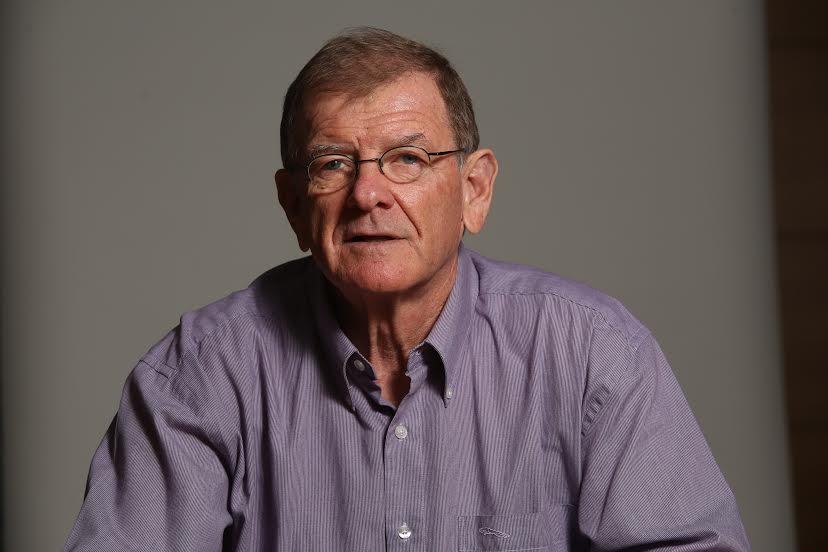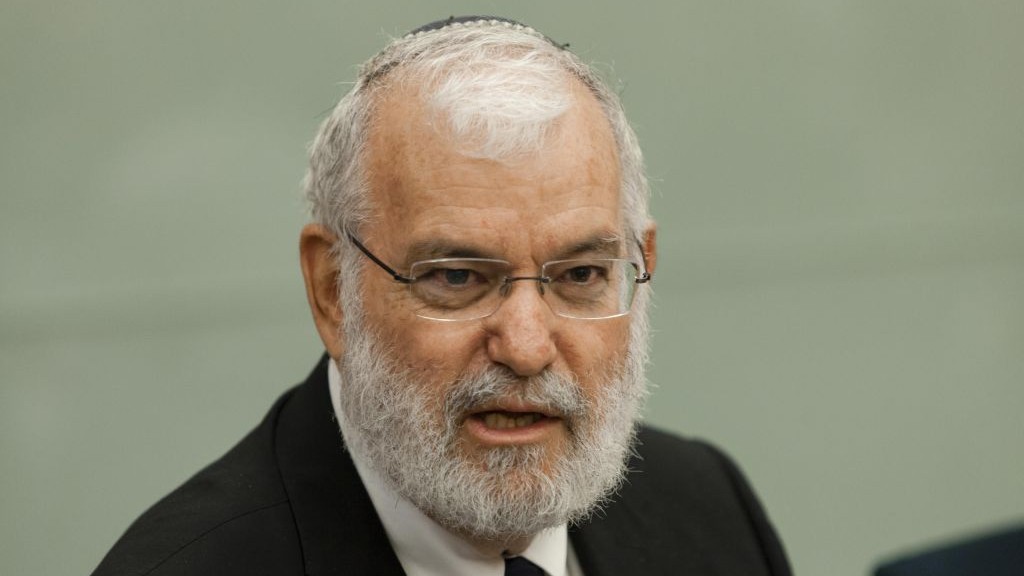Australia/Israel Review
Essay: Terror Wave that Reshaped the Nation
Oct 5, 2020 | Herb Keinon

20 years since the Second Intifada
The place-names still send shivers up and down the spine.
The police station in Ramallah; Jerusalem’s Gilo neighbourhood; the Dolphinarium discotheque in Tel Aviv; the Sbarro Pizzeria and Cafe Moment in the capital; the Park Hotel in Netanya; Maxim Restaurant in Haifa. The names bring to mind some of the bloodiest atrocities committed by Palestinian terrorists during the Second Intifada that began 20 years ago, on Sept. 28, 2000.
Each of Israel’s wars have had their memorable battles. There was Operation Nachshon in the War of Independence; the Battle for Sharm e-Sheikh in the Sinai Campaign; Ammunition Hill in the Six Day War; Chinese Farm during the Yom Kippur War; the Battle of Jezzine in the First Lebanon War.
But while during the Second Intifada the Battle of Jenin during Operation Defensive Shield, the intifada’s turning point, has been seared into the country’s memory, for the most part it is the names of eateries, road junctions or markets – Mike’s Place, Megiddo Junction, the Carmel Market – that are associated with this period. Because it was the restaurants, bars, buses and road junctions in the heart of the country that constituted the main front in that war.
More Israelis were killed during the Second Intifada – 1,053, according to Foreign Ministry figures – than were killed in the 1956 Sinai Campaign (231), the 1967 Six Day War (776) or the 2006 Second Lebanon War (164). More civilians, about 70% of the total fatalities, were killed in the Second Intifada than in any campaign with the exception of the War of Independence.
The Second Intifada, which for the average citizen felt very much like a war in everything but name, was a defining event in Israel’s history, akin to the War of Independence and the Six Day and Yom Kippur wars.
This harrowing period fundamentally altered Israeli society because it impacted everyone. No one, regardless of their political opinions, level of religious observance or ethnicity, was left unaffected.
Mind-numbing terrorism made it scary to ride a bus, nerve-wracking to send kids to school, a psychological effort to take the family downtown for a falafel.
And the trauma of that period remains.
To understand Israel today – to understand its political turn to the Right, why Israelis have voted time and time again for Prime Minister Binyamin Netanyahu, its complete lack of confidence in the Palestinians, its indifference to the lack of a diplomatic process with the Palestinians – is to understand the strain and pressure that everyone in the country laboured under during the four years and five months of that intifada.
Israelis were well acquainted with security challenges before September 2000. But for the most part there was a strong sense of personal security in the cities up until then. Sure, you didn’t want to walk along the borders or traipse around in the West Bank cities or even part of east Jerusalem, but there was a sense of being safe at home, in the streets, in the cinema, at restaurants.
The Second Intifada changed all that. Then no place seemed safe: riding the bus felt like a dice roll, coffee shops a potential deathtrap.
A reservist wearing a flak jacket and carrying an M16 serving in a small outpost just across the Syrian border fence on the Golan Heights in March 2002 – the deadliest month of the Intifada – felt more secure in his well-guarded base ringed by tanks than his elementary school children felt riding public buses to school in Jerusalem.
And everyone, literally everyone, knew someone either killed or injured during the violence – a relative, friend, co-worker, schoolmate, client, business partner.
This reality of intense insecurity seeped into everyone’s lives and left an indelible impact.
One of the ways to gauge that impact is to look at the country’s political map. Israel goes to elections quite a bit. Since 1999, the year before the Second Intifada, it has held 10 elections, including an election just for the prime minister – not the Knesset – in 2001.
The results: The Left won one election, Ehud Barak in 1999. The Centre won one, 2006 with Kadima headed by Ehud Olmert, and tied another, Blue and White’s showing in September 2019. The Right won six times, and battled to a draw in one (March 2020).
Why? Did the country all of a sudden grow callous? Did it give up on a dream of peace? No, coming out of the Oslo euphoria of the 1990s, Israel was simply mugged by the reality of the Second Intifada.

Meir Elran: The Intifada “left emotional and cognitive scars”
“The voting patterns show that the right wing not only now has a majority, but has even gotten stronger, and this is a result of the scope and intensity of the Intifada,” said Meir Elran, a researcher at the Institute for National Security Studies in Tel Aviv who has written extensively on Israeli national resilience during and after the Intifada. “This was mainly terror against civilians. And unlike the First Intifada, which took place mainly in the territories, this took place for the most part inside the Green Line – it was extremely traumatic.”
One of the reasons it was so traumatic, said Elran, who was deputy director of Military Intelligence during the beginning of the First Intifada that began in 1987, was its intensity and duration.
Elran dates the Second Intifada from Sept. 28, 2000, when opposition leader Ariel Sharon went to the Temple Mount and the Palestinians responded with riots that swiftly spread, to September 2004, when the number of terrorist attacks began to decline. Others, however, extend the Intifada’s duration another five months until February 2005, after Yasser Arafat’s death, when Sharon – then prime minister – met new Palestinian Authority President Mahmoud Abbas at a summit at Sharm el-Sheikh.
Regardless, this was a long war. Not only was it long, it was harsh – with more than 130 suicide bombings.
“It is an event that left emotional and cognitive scars,” Elran said.
The Intifada, Elran said, disabused many Israelis of a belief in being able to reach any agreement with the Palestinians and created a sense in the minds of millions that there was simply no one on the other side to talk to.
Tamar Hermann, director of the Guttman Centre for Public Opinion and Policy Research at the Israel Democracy Institute and a political science professor at the Open University, agrees with Elran and said the now deeply held belief among many Israelis that there is simply no partner on the other side is one of the most significant lasting impacts.
“It is quite obvious that the Second Intifada made even those Jewish Israelis most supportive of the peace process rethink not their perspective on the desirability of peace, but rather on its feasibility,” she said.
Paradoxically, Hermann added, it was Ehud Barak who pumped up the notion of there being no Palestinian partner when he came back from the failed Camp David summit in July 2000 and said the refusal of the Palestinians to accept his generous offer was proof there was no one to talk to on the other side.
“Israelis still support the idea of peace – we all allegedly support peace – but they don’t see it as a feasible political goal anymore, and put most of the blame on the other side,” she said.
Elran took this even further and said that not only do Israelis not believe there is a partner on the other side, but because of the Intifada “the Israeli public doesn’t want to hear about the Palestinians.”
“The violence led Israelis to place an ‘X’ on the Palestinians,” he said. “And there are two factors now reinforcing that ‘X’ – one is the behaviour of Hamas in Gaza, which always reminds Israelis of what they are dealing with, and the second is the leadership in Ramallah, whose behaviour only reinforces the feeling that there is no one to talk to.”
Hermann said that another significant element of the Intifada is that the Israeli public credits Israel’s security apparatus for ending it.
“It appears that the Israeli Jews, when they think about the Second Intifada, think that the Israeli security agencies are responsible – in a positive way – for the sharp decline in the terrorism, and that they acted very effectively against it. They do not attribute the decline of the Intifada to any decision by the other side to stop using terror, or to minimise the use of terror.”

Gen. (ret.) Yaakov Amidror: “If you do not control the territory, you can’t fight terrorism.”
Former national security adviser Yaakov Amidror contrasted the lesson Israel learned from the First Intifada, which led to some 177 Israelis being killed, and the Second Intifada.
“The First Intifada did one thing clearly: it made clear to the Israelis that there are no free lunches, and that there is a price to holding on to the territories,” he said.
And the main lesson for Israelis from the Second Intifada, he said, “is that if you do not control the territory, you can’t fight terrorism.” The intensity and lethal nature of the Second Intifada could only happen, he argued, “because we did not control the territory.”
Another key lesson the public took away from the rampaging violence, said Amidror, today a fellow at the Jerusalem Institute for Strategy and Security, is that it “is impossible to trust the Palestinians.”
Amidror noted that the Intifada broke out “after we had an agreement with Arafat. This wasn’t the First Intifada, where there was nothing between us and the Palestinians beforehand. We were after the Oslo Accords when we let them back into the territory. This led to a dramatic loss of confidence in them.”
Amidror, who stressed that he is not a psychologist, said that what remains in the minds of Israelis two decades after the eruption of the Second Intifada is “the sense that in the final analysis our security has to be in our own hands,” and that this “cannot be compromised in any way.”
Asked if this was not something obvious to most Israelis even beforehand, he replied: “We had illusions. Oslo was built on the premise that we could work with the Palestinians.”
Amidror argued that this premise was embraced by the politicians who negotiated the Oslo Accords, but was never accepted by the security establishment or “professional echelon,” of which he was a part at the time in his role as head of Military Intelligence’s research division.
“We said this won’t work, and the reality turned out to be even more difficult than we imagined.”
As to the Intifada’s long-term impact on the Palestinians, Amidror said they realise now that if they initiate violence against civilians, they will “pay a much heavier price than we will.”
“I think they now understand that if they use violence we will respond in a much stronger way because our capabilities are so much greater, and that if they pass a certain line we will respond with great strength,” he said.
Amidror said the Palestinian Authority now also understands that the only guarantor keeping Hamas from taking over all the territories is Israel.
Those two lessons, in addition to an Israeli policy aimed at improving the economic and security situation for the Palestinians in the West Bank, is preventing another Intifada-type explosion, he maintained.
“If you take an average Palestinian in Nablus, and ask him where it is better to live today – in Cairo, Amman, Damascus or Baghdad, without occupation, or in Nablus with all the limitations of Israeli occupation, what do you think his answer will be? He has to be stupid not to think that life is better in Nablus.”
And finally, Amidror said, the Second Intifada also left its mark on Israel’s neighbours. He drew a direct line from the way Israel withdrew from Lebanon in May 2000 – he used the expression “ran away” – to the outbreak of the Intifada, saying this created a perception that Israel was not as strong as it appeared.
This Intifada was the result of a decision taken by Arafat, not a spontaneous combustion, he stressed, adding that Arafat’s decision was made within the context of the Lebanon withdrawal.
“There is no doubt that the Intifada came against the background of a perception in the Arab world of Israeli weakness following the retreat from Lebanon,” he said.
But, Amidror continued, the manner in which Israel dealt with and eventually put down the Intifada “made clear to the neighbourhood, that if Israel is cornered, it will respond with great might. I think the Arab states saw that there is a line which, when passed, Israel will respond forcefully. You can push a long time – it took a long time before Sharon gave the order to move back into Judea Samaria [March 2002] – but when you cross a certain point… Israel will respond with great power and might.”
It was that power and might that eventually did put an end to the nightmare of the Second Intifada, but its memory more than just lingers 20 years after its start – it continues to impact strongly on how the country acts, votes and views solutions to the Palestinian issue.
Herb Keinon is diplomatic correspondent at the Jerusalem Post. © Jerusalem Post (jpost.com), reprinted by permission, all rights reserved.
Tags: Israel, Palestinians, Terrorism






